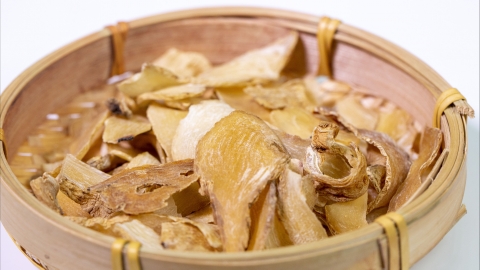What should not be consumed with Tianma (Gastrodia elata)?
Generally speaking, Gastrodia (Tianma) should not be taken with certain foods such as wind-protecting herb root (Yufengcao Gen), chicken meat, lamb meat, Chinese chives, chili peppers, and medications such as Nifedipine Tablets, Diazepam Tablets, Phenobarbital Tablets, Carbamazepine Tablets, Reserpine Tablets, etc., as this may cause adverse reactions. Detailed explanations are as follows:

I. Foods
1. Wind-protecting herb root: Its properties are contrary to those of Gastrodia. Taking them together may lead to adverse reactions, affect the efficacy of Gastrodia, and potentially harm the body; therefore, they should not be consumed together.
2. Sparrow meat: This is a warming food. Gastrodia has a neutral nature. Combining the two may alter the medicinal properties of Gastrodia, affect its therapeutic effects, and possibly increase internal heat, which is not conducive to the body's absorption and utilization of its medicinal effects.
3. Lamb meat: Lamb is warm in nature. Since Gastrodia has certain medicinal effects, taking them together may cause conflicting actions, not only reducing the efficacy of Gastrodia but also potentially causing physical discomfort and affecting health.
4. Chinese chives: These are warm and pungent in flavor and have an irritating effect. When taken with Gastrodia, they may irritate the gastrointestinal tract, affect the digestion and absorption of Gastrodia, and interfere with its medicinal effects, thereby reducing its efficacy.
5. Chili peppers: As spicy and irritating foods, chili peppers may irritate the gastrointestinal mucosa. When taken with Gastrodia, they may affect the absorption and metabolism of Gastrodia in the body, thereby reducing its medicinal effectiveness.
II. Medications
1. Flunarizine Hydrochloride Capsules: These belong to calcium channel blockers. Taking them with Gastrodia may affect drug metabolism, change their concentrations in the body, and consequently affect efficacy or increase the likelihood of adverse reactions. Therefore, caution should be exercised when using them together.
2. Alprazolam Tablets: These are sedative-hypnotic drugs. Gastrodia also has a sedative effect. Taking them together may enhance the sedative effect, leading to increased symptoms such as drowsiness and fatigue, affecting normal physical activities. Therefore, they should be avoided for concurrent use.
3. Phenytoin Sodium Tablets: These are used to treat diseases such as epilepsy. Taking them with Gastrodia may affect the metabolic process of the drug in the body, altering its efficacy or increasing toxicity and side effects. Therefore, cautious use under a physician's guidance is required.
4. Carbamazepine Tablets: These are used to treat epilepsy and other diseases. Taking them with Gastrodia may affect the drug's metabolism in the body, altering its efficacy or increasing toxic side effects. Thus, cautious use under a physician's guidance is required.
5. Reserpine Tablets: These are antihypertensive drugs. Taking them with Gastrodia may interfere with each other's efficacy, affecting blood pressure control or the medicinal effects of Gastrodia. Close monitoring of bodily reactions is necessary when using them together.
When using Gastrodia, attention should be paid to dietary combinations, and it should not be taken with the above-mentioned foods and medications. If other medications are needed during the use of Gastrodia, relevant conditions should be reported to the doctor in advance, and medication should strictly follow medical instructions.




